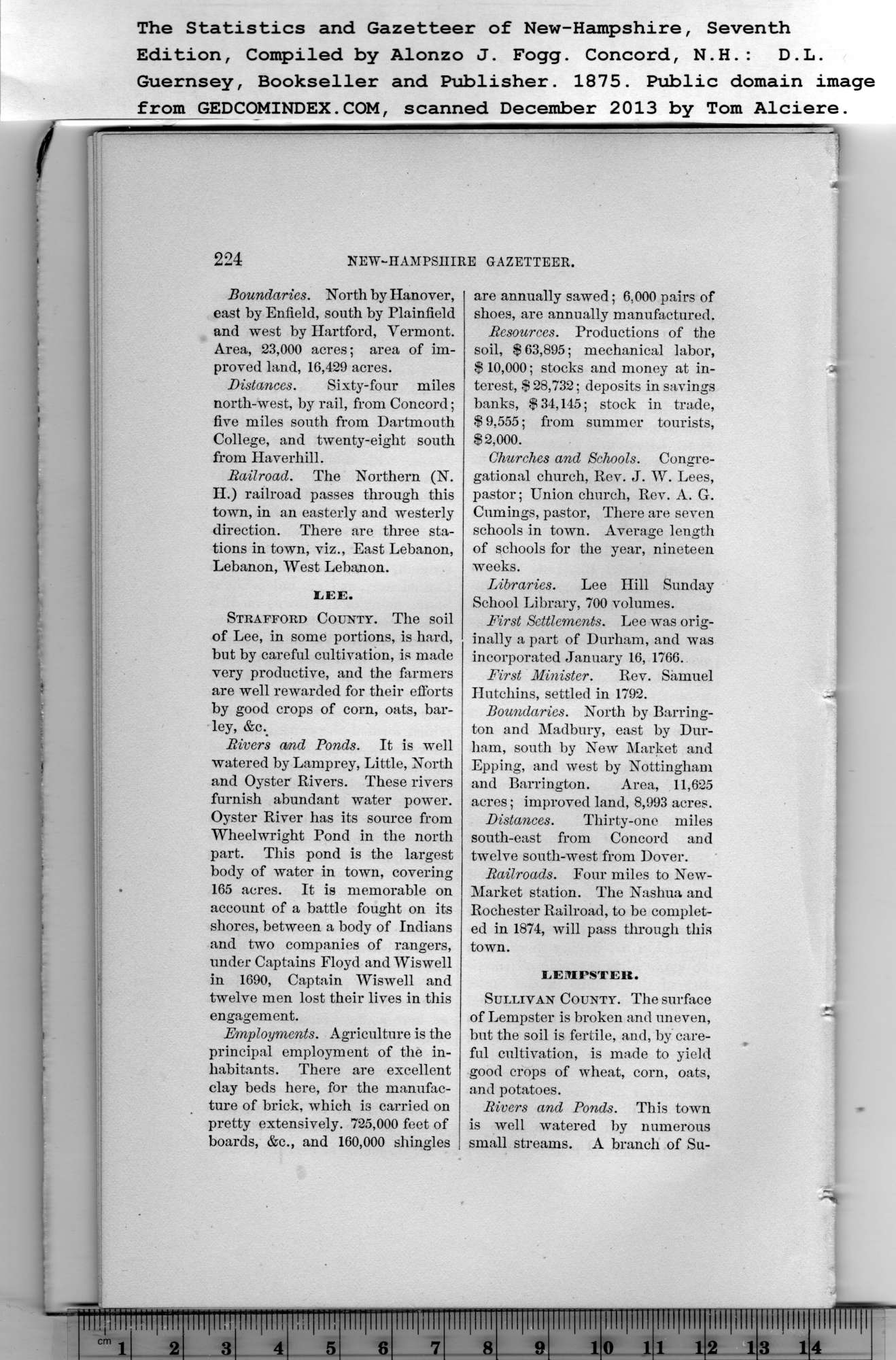|
Boundaries. North by Hanover,
east by Enfield, south by Plainfield
and west by Hartford, Vermont.
Area, 23,000 acres; area of im-
proved land, 16,429 acres.
Distances. Sixty-four miles
north-west, by rail, from Concord;
five miles south from Dartmouth
College, and twenty-eight south
from Haverhill.
Railroad. The Northern (N.
II.) railroad passes through this
town, in an easterly and westerly
direction. There are three sta-
tions in town, viz., East Lebanon,
Lebanon, West Lebanon.
LEE.
Strafford County. The soil
of Lee, in some portions, is hard,
but by careful cultivation, is made
very productive, and the farmers
are well rewarded for their efforts
by good crops of corn, oats, bar-
ley, &c._
Rivers and Ponds. It is well
watered by Lamprey, Little, North
and Oyster Rivers. These rivers
furnish abundant water power.
Oyster River has its source from
Wheelwright Pond in the north
part. This pond is the largest
body of water in town, covering
165 acres. It is memorable on
account of a battle fought on its
shores, between a body of Indians
and two companies of rangers,
under Captains Floyd and Wiswell
in 1690, Captain Wiswell and
twelve men lost their lives in this
engagement.
Employments. Agriculture is the
principal employment of the in-
habitants. There are excellent
clay beds here, for the manufac-
ture of brick, which is carried on
pretty extensively. 725,000 feet of
boards, &c., and 160,000 shingles
are annually sawed; 6,000 pairs of
shoes, are annually manufactured. |
Resources. Productions of the
soil, $63,895; mechanical labor,
$ 10,000; stocks and money at in-
terest, $ 28,732; deposits in savings
banks, $34,145; stock in trade,
$9,555; from summer tourists,
$2,000.
Churches and Schools. Congre-
gational church, Rev. J. W. Lees,
pastor; Union church, Rev. A. G.
Cumings, pastor, There are seven
schools in town. Average length
of schools for the year, nineteen
weeks.
Libraries. Lee Ilill Sunday
School Library, 700 volumes.
First Settlements. Lee was orig-
inally a part of Durham, and was
incorporated January 16, 1766.
First Minister. Rev. Samuel
Hutchins, settled in 1792.
Boundaries. North by Barring-
ton and Madbury, east by Dur-
ham, south by New Market and
Epping, and west by Nottingham
and Barrington. Area, 11,625
acres; improved land, 8,993 acres.
Distances. Thirty-one miles
south-east from Concord and
twelve south-west from Dover.
Railroads. Four miles to New-
Market station. The Nashua and
Rochester Railroad, to be complet-
ed in 1874, will pass through this
town.
LEMFSTEK.
Sullivan County. The surface
of Lempster is broken and uneven,
but the soil is fertile, and, by care-
ful cultivation, is made to yield
good crops of wheat, corn, oats,
and potatoes.
Rivers and Ponds. This town
is well watered by numerous
small streams. A branch of Su- |
